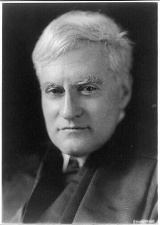
lawyer
and associate Supreme Court Justice
. Cardozo is remembered for his significant influence on the development of American common law in the 20th century, in addition to his modesty, philosophy, and vivid prose style. Cardozo served on the Supreme Court
only six years, from 1932 until his death in 1938, and the majority of his landmark decisions were delivered during his eighteen year tenure on the New York Court of Appeals
, the highest court of that state.
Cardozo was born in New York City
, the son of Rebecca Washington (née Nathan) and Albert Jacob Cardozo
.
The law has outgrown its primitive stage of formalism when the precise word was the sovereign talisman, and every slip was fatal. It takes a broader view to-day. A promise may be lacking, and yet the whole writing may be "instinct with an obligation," imperfectly expressed. If that is so, there is a contract.![]()
Justice is not to be taken by storm. She is to be wooed by slow advances. Substitute statute for decision, and you shift the center of authority, but add no quota of inspired wisdom. ![]()
Danger invites rescue. ... The wrongdoer may not have foreseen the coming of a deliverer. He is accountable as if he had.![]()
Inaction without more is not tantamount to choice.![]()
Not honesty alone, but the punctilio of an honor the most sensitive, is then the standard of behavior.![]()
With traps and obstacles and hazards confronting us on every hand, only blindness or indifference will fail to turn in all humility, for guidance or for warning, to the study of examples.![]()
Method is much, technique is much, but inspiration is even more.![]()

